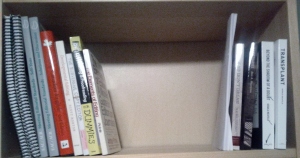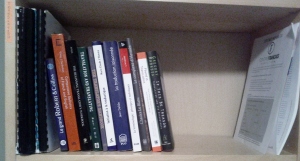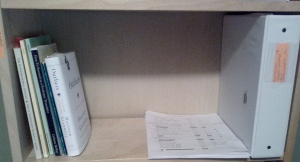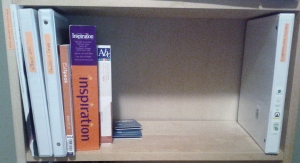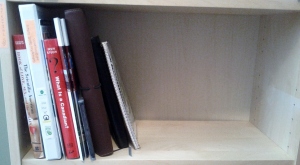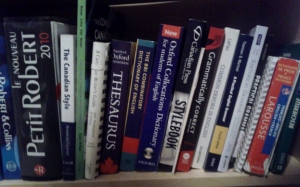It’s true: this translator is about to add “diaper changer” and “baby sustainer” to her list of skills! It’s been quite the experience, getting ready for becoming a parent, especially in terms of researching maternity benefits, what to tell my clients and trying to decide how much (and how soon) I can continue working after baby is born.
I have to say that, as usual, I found the most reassuring and helpful starting-point advice on Corinne’s McKay’s blog. She wrote a post on taking leaves of absence, and her tips were a great source of comfort to me. In particular, she started out by acknowledging how daunting it can be to envision taking time off. That rang especially true for me, because I’m in my third year of freelancing and I’ve finally reached the (AMAZING) point of having a regular rotation of fantastic clients and, sometimes, more work than I can handle.
(Wow. That’s the first time I’ve actually stopped to think about how incredibly lucky I am. Forgive me a moment while I do a crazy happy dance.)
So the thought of taking time off now is definitely nerve-wracking. What if my clients forget me? Move on? I know we’re pretty tight but I can’t expect them to just wait. (Maybe I’ll write a post on how, in the end, I decided to handle this dilemma.)
Corinne also suggests being upfront about why you’re taking leave, but a little vague on how long you’ll be gone. This gives you flexibility if you need more time—or, I guess, if you get lucky and have a baby who just sleeps like an angel and you can take on a bit of work. There’s lots more in Corinne’s post and I highly recommend checking it out if this is something you’re wondering about:
Some thoughts on leaves of absence (maternity and otherwise) by Corinne McKay
After that, I started doing some research into possible maternity benefits in Canada. It turns out, Canada has what seems to me to be a pretty great special benefits program for self-employed people. I couldn’t believe it. I can take real “maternity leave” as a freelancer? Yes, yes I can.
“Under the Employment Insurance Act, self-employed Canadians and permanent residents—those who work for themselves—are able to apply for EI special benefits if they are registered for access to the EI program.” (Program website)
“Maternity benefits are for mothers who give birth. These benefits cover the period surrounding the child’s birth (up to 15 weeks).
Parental benefits are for any parent (mother or father) to care for their newborn or newly adopted child or children. Either parent can receive benefits, or they can share benefits between them (up to 35 weeks).”(Program website)
But it takes LOTS of forethought. Here’s how it works:
If you’re eligible (I am), you sign up for the program:
“If you are eligible for EI special benefits, you can expect to receive 55% of your average weekly earnings up to a defined annual limit.” (Program website)
But (VERY important), you have to do it AT LEAST 12 MONTHS IN ADVANCE:
“You have to wait 12 months after the day you register before you will be able to apply for EI special benefits.” (Program website)
Registering for the program means paying into it:
“As with any insurance program, you will need to pay premiums. In 2014, for every $100 you earn, you will need to contribute $1.88 in EI premiums up to a defined maximum—the same amount that employees pay. This means the most you will pay in EI premiums for 2014 is $913.68.” (Program website)
And yes, you can take on work while claiming benefits:
“If you are claiming sickness or maternity benefits, we will deduct any part-time earnings from your benefits on a dollar-for-dollar basis.” (Program website)
So far so good. I signed up for the program on February 16, 2014, which means the earliest I can apply for benefits is this coming February 16. With Baby due on the 21st of February, I confess that it’s a bit close for comfort (there’s also a two-week waiting period after you apply to claim your benefits), but we’ll make it work.
There are still some question marks for me that I need to research, all to do with working while claiming. Obviously, having earnings deducted dollar-for-dollar means that, financially, there’s no incentive to work during the “maternity benefits” period, but with freelancing the benefits of keeping your foot in the door outweigh, I think, the deduction factor. (Assuming it’s possible to work while still taking all the time I can to snuggle that little bundle of baby boy joy!)
The website’s explanation of working during the “parental benefits” period is more complicated, at least to me:
“If you are claiming parental, compassionate care or parents of critically ill children benefits, you normally can earn either a maximum of 25% of your weekly benefit (if your weekly benefit amount is $200 or more) or a maximum of $50 (if your weekly benefit amount is less than $200) without changing the amount of EI benefits you receive for that week. We will deduct any money you earn above that amount from your benefits on a dollar-for-dollar basis.
However, effective August 5, 2012 until August 1, 2015, a pilot project is in place which changes the way earnings are deducted.
Under the Working While on Claim (WWC) pilot project, once you have served your waiting period, your benefits will be reduced by a rate of 50% of your earnings each week if the earnings are equal to or less than 90% of your weekly earnings that were used to calculate your benefit rate. Any earnings that exceed the 90% threshold will be deducted dollar for dollar from your benefits.” (Program website)
This is the part that I need to research further. Will I be part of the pilot project even though my leave may extend beyond that? I suppose this is kind of a problem for down the road, once I know how much I actually can work while balancing baby-snuggling.
The other odd thing is that, since you pay your premiums in April of the year AFTER you register, I’ll actually be claiming benefits before I’ve even paid my premiums. That seems odd to me.
In any case, I feel so relieved that I had the luxury of planning to enter the program a year in advance, and I’m very grateful that our government provides these sorts of benefits. It really is the best of both worlds: living the freelancing dream without sacrificing much-needed family benefits.
I wonder how this program compares to what’s available in other countries. Anyone?
And on a more personal note: I’m so excited to become a mom. My husband and I are eagerly awaiting Baby’s arrival. The nursery is ready, even though the rest of the house is in a state of chaos as we’ve had to reshuffle everything to fit in all the baby gear!
I’ll be at 35 weeks tomorrow, and his due date is February 21. My prediction is that he’ll be early. But apparently lots of first-timers think that, I’m told.
Here’s a photo from back at 28 weeks!

I did feel glowy back then! Now… I feel excited and proud and amazed with my body, but less glowy and more… puffy. 😉










